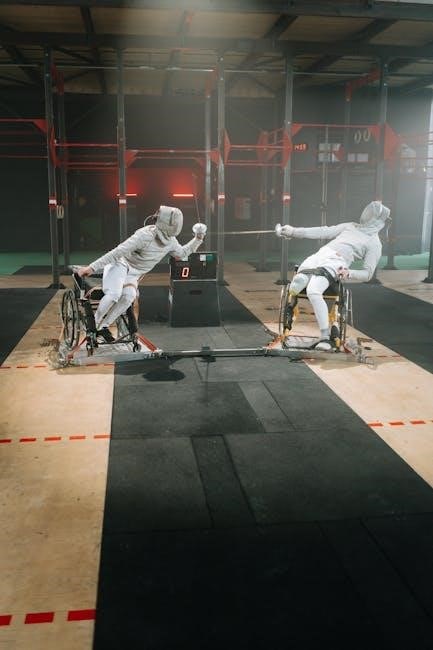Theodore Roosevelt’s iconic “Man in the Arena” speech, delivered in Paris in 1910, emphasizes courage and action over criticism. Its powerful message resonates globally, inspiring leaders and individuals alike. The speech is widely available as a PDF, offering readers a timeless reflection on citizenship, perseverance, and the human spirit.
Overview of the Speech and Its Significance
Theodore Roosevelt’s “Man in the Arena” speech, delivered at the Sorbonne in Paris on April 23, 1910, is a powerful call to action that emphasizes the importance of active citizenship and personal responsibility. The speech, part of a larger address titled “Citizenship in a Republic,” critiques the role of critics and praises those who take risks and strive valiantly. Its central message has made it one of Roosevelt’s most enduring works, inspiring countless individuals to embrace challenge and perseverance. The speech’s themes of courage, effort, and the human condition continue to resonate widely, making it a cornerstone of motivational culture and leadership philosophy.
Theodore Roosevelt’s Role in American History

Theodore Roosevelt, the 26th U.S. President, was a transformative figure in American history. Known for his dynamic leadership and progressive policies, he championed the “Square Deal,” promoting fairness in business and social reforms. His trust-busting efforts aimed to curb corporate power, while his conservation initiatives protected millions of acres of land. Roosevelt’s foreign policy, including the construction of the Panama Canal, showcased his assertive approach. He was also a Nobel Peace Prize laureate for mediating the Russo-Japanese War. His philosophy of the “strenuous life” and emphasis on civic duty continue to inspire. Roosevelt’s legacy as a leader, writer, and thinker remains profound, shaping American identity and global influence.

Historical Background of the Speech
The Man in the Arena speech was delivered by Theodore Roosevelt at the Sorbonne in Paris on April 23, 1910, titled Citizenship in a Republic. It emphasized civic responsibility and courage.
Date and Location of the Speech: Sorbonne, Paris, April 23, 1910
Theodore Roosevelt delivered his iconic “Man in the Arena” speech at the Sorbonne in Paris on April 23, 1910. Titled “Citizenship in a Republic,” the speech was part of a broader lecture series during Roosevelt’s European tour. The speech gained widespread recognition for its powerful message about courage, responsibility, and the importance of active participation in society. A PDF version of the speech is widely available, allowing readers to access Roosevelt’s timeless words. The speech’s historical significance is underscored by its delivery in one of Europe’s most prestigious academic institutions, making it a landmark moment in Roosevelt’s post-presidency career. The PDF format ensures its enduring accessibility for modern audiences.
Context: Citizenship in a Republic

The “Man in the Arena” speech is part of a larger lecture titled “Citizenship in a Republic,” delivered by Theodore Roosevelt at the Sorbonne in Paris on April 23, 1910. The speech emphasizes the importance of active citizenship and the responsibilities that come with it. Roosevelt advocates for individuals to engage in public life, highlighting the contrast between those who critique from the sidelines and those who take risks in the “arena.” The speech’s central theme of civic duty resonates deeply, encouraging individuals to strive for greatness despite the possibility of failure. A PDF version of the speech is widely accessible, offering readers a comprehensive understanding of Roosevelt’s vision for citizenship and national progress. The lecture remains a cornerstone of motivational and political discourse, continuing to inspire modern audiences.
Key Themes of “The Man in the Arena”
The speech highlights courage, perseverance, and the importance of action over criticism. The PDF version underscores Roosevelt’s emphasis on embracing challenges and striving for greatness, inspiring modern readers.
The Critic vs. The Doer: A Central Message
Roosevelt’s speech vividly contrasts the critic with the doer, emphasizing that true value lies in action. The PDF version highlights his assertion that critics, who merely point out flaws, are far less impactful than those who actively engage in the arena. He argues that it is the doer who faces challenges, endures setbacks, and strives valiantly, despite the risk of failure. This theme encourages individuals to embrace an active role in life, rather than remaining passive observers. The message remains timeless, inspiring readers to pursue their goals with courage and determination, undeterred by criticism.
The Concept of the Arena as a Metaphor for Life
Roosevelt’s speech uses the arena as a powerful metaphor for life, symbolizing the challenges and struggles individuals face. The PDF version of the speech underscores this idea, portraying the arena as a place of action, courage, and perseverance. Life, like the arena, demands participation, risk-taking, and resilience. The metaphor encourages individuals to embrace their roles actively, rather than remaining spectators. It highlights the importance of effort and determination, even in the face of failure. This concept remains a cornerstone of motivational philosophy, inspiring readers to view life as an arena where meaningful engagement and growth occur. The speech’s enduring relevance lies in its universal appeal to strive and persevere.

Legacy of the Speech
The “Man in the Arena” speech has left an enduring legacy, inspiring countless individuals to embrace action and perseverance. Its motivational impact continues to resonate strongly today.
Impact on Modern Motivational Culture
The “Man in the Arena” speech has profoundly shaped modern motivational culture, inspiring individuals to embrace challenges and perseverance. Its themes of courage and action are widely referenced in self-help literature, sports, and leadership training. The speech’s emphasis on overcoming criticism resonates deeply, making it a cornerstone of motivational rhetoric; Available as a PDF, it remains a accessible resource for those seeking inspiration. Athletes, entrepreneurs, and public figures often cite Roosevelt’s words, showcasing its enduring relevance. The speech’s message of resilience has also influenced contemporary movements, encouraging individuals to step into their own “arena” and strive for greatness despite setbacks and skepticism.
Use in Sports and Leadership
Theodore Roosevelt’s “Man in the Arena” speech has become a cornerstone in sports and leadership, inspiring individuals to embrace challenge and perseverance. Athletes and leaders often reference its themes of courage and resilience, using them to motivate teams and individuals. The speech’s emphasis on action over criticism resonates deeply, encouraging leaders to take bold steps. In sports, the speech is frequently cited by coaches and players to foster mental toughness. As a PDF, it is widely shared in training programs and leadership seminars, offering practical insights into overcoming adversity. Its message of striving valiantly, despite setbacks, continues to empower leaders and athletes worldwide, making it a timeless motivational tool.
The “Man in the Arena” PDF
The Man in the Arena speech is widely available as a downloadable PDF, offering readers access to Roosevelt’s timeless wisdom. It can be found through various online platforms, including academic journals and motivational resources, making it easily accessible for personal or professional use.
Availability and Downloads
The Man in the Arena speech is widely accessible in PDF format, available for download through various online platforms. It can be found in academic journals, motivational resources, and historical archives. The speech is often included in collections of Roosevelt’s works, such as the Theodore Roosevelt Association Journal. Users can easily locate and download the PDF by searching through reputable websites or educational databases. Additionally, the speech is frequently shared on platforms like GitHub and Google Drive, ensuring its availability for personal or professional use. Its widespread distribution underscores its enduring relevance and popularity as a source of inspiration and historical insight.
Key Excerpts and Quotes
The Man in the Arena speech is renowned for its powerful quotes, with one of the most iconic being: “It is not the critic who counts, not the man who points out how the strong man stumbles.” Roosevelt emphasizes the importance of action over criticism, stating, “The credit belongs to the man who is actually in the arena, whose face is marred by dust and sweat and blood.” These excerpts highlight the speech’s central theme of perseverance and courage. The speech also includes inspiring lines about striving valiantly and embracing effort, regardless of success or failure. These quotes are widely shared and have become motivational fixtures in literature, sports, and leadership contexts, resonating with audiences globally.
Connections to Other Works by Theodore Roosevelt
Theodore Roosevelt’s “The Man in the Arena” speech aligns with his themes in “The Strenuous Life” and “The Rough Riders,” emphasizing action, perseverance, and leadership.
The Strenuous Life and The Rough Riders
Theodore Roosevelt’s “The Man in the Arena” speech resonates with his earlier works, such as The Strenuous Life and The Rough Riders. In The Strenuous Life, Roosevelt championed a life of effort, challenge, and moral courage, aligning with the speech’s theme of embracing struggle. Similarly, The Rough Riders, recounting his experiences in the Spanish-American War, highlights his belief in action over criticism, mirroring the speech’s critique of passive observers. These works collectively reflect Roosevelt’s philosophy of active citizenship and leadership, emphasizing the importance of daring to act and face adversity. The “Man in the Arena” PDF further encapsulates these ideals, offering a timeless call to courage and perseverance.

Cultural References to the Speech
The Man in the Arena speech is widely referenced in literature, film, and politics, inspiring works and public figures. Its themes of courage and action are timeless.
In Literature, Film, and Politics
The Man in the Arena speech has left an indelible mark on literature, film, and politics. Authors often draw inspiration from its themes of courage and perseverance, while filmmakers use the arena metaphor to depict heroism and struggle. Politicians frequently reference the speech to highlight the importance of bold action over passive criticism. The PDF version of the speech is widely shared in these contexts, serving as a motivational tool for leaders and creators alike. Its timeless message continues to resonate across genres, cementing its place in modern culture and discourse.
The Man in the Arena speech remains a timeless call to action, inspiring modern audiences to embrace challenge and perseverance. Its availability as a PDF ensures its ideals endure.

Relevance of the Speech in the Modern World
Theodore Roosevelt’s Man in the Arena speech remains profoundly relevant today, urging individuals to embrace action over criticism. In a world dominated by social media and instant judgment, its message of courage and perseverance resonates deeply. The speech’s emphasis on personal responsibility and striving, despite failure, aligns with modern motivational culture. Its availability as a PDF ensures accessibility, inspiring new generations to step into their own “arena” and contribute meaningfully to society. The timeless philosophy of the speech continues to influence leadership, sports, and personal growth, proving its enduring impact in the 21st century.